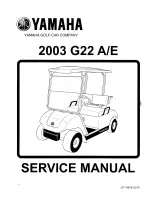
6
Brake Pads and Caliper
HYDRAULIC BRAKE AND PARK BRAKE
SYSTEMS
3
1
4
5
2
2755
Figure 6-2
Front Brake Pad and Caliper
FRONT BRAKE PAD INSTALLATION
WARNING
• If at any point in this procedure the hydraulic system is opened, the brakes must be bled after the
correct reinstallation of the brake components. Failure to bleed the brakes could result in decreased
braking performance due to air being trapped in the hydraulic system. Use only DOT 5 brake fluid. See
Bleeding the Hydraulic Brake System on page 6-18.
1.
Place inner brake pad onto caliper pins.
See following NOTE and WARNING.
NOTE:
To help prevent noise, a silicone-based brake lubricant may be applied to the surfaces (on the back side of
the brake pads) that contact the caliper. A thin film may also be applied to the slide-pins. Always follow
lubricant manufacturer's directions.
WARNING
• To reduce the possibility of diminished brake performance or failure, never use petroleum-based
lubricants on brake system components, and ensure lubricant does not contact friction surfaces of
brake pads or rotors.
2.
Install brake disc onto hub.
3.
Place outer brake pad onto caliper pins.
4.
Install outer caliper half and secure with two hex-head bolts (2). Tighten bolts to 360 in-lb (40.6 N·m).
5.
Repeat procedure for the opposite brake if necessary.
6.
Install the tire and wheel. Finger-tighten the lug nuts.
7.
Lower the vehicle and use a crisscross pattern to tighten the lug nuts to 85 ft-lb (115 N·m).
8.
Inspect the brake system.
See Brake System Inspection on page 6-1.
9.
Burnish the new pads before initial vehicle operation. On a flat, open surface, accelerate the vehicle to moderate
speed, then apply the brakes under modest, steady pressure. Repeat this procedure eight to twelve times.
Page 6-8
2016 Carryall 1500/1700 and XRT 1550 Maintenance and Service Manual
Summary of Contents for Carryall 1500 2016
Page 2: ......
Page 432: ...NOTES...
Page 433: ...NOTES...
Page 434: ...NOTES...
Page 435: ......
Page 436: ......




































